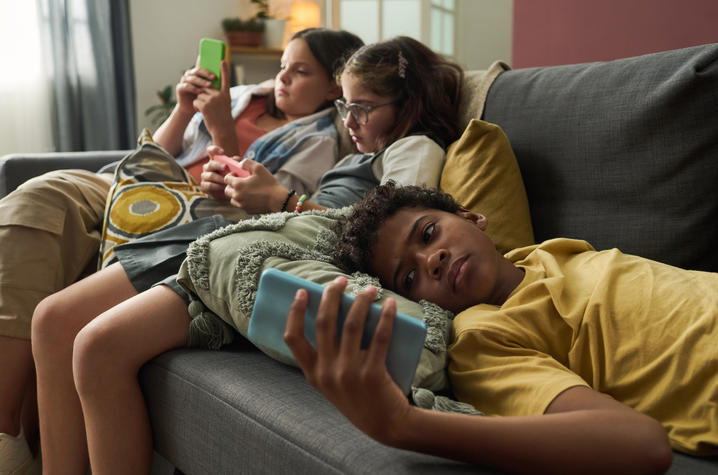Don’t let summer boredom default to screen time
The University of Kentucky Public Relations and Strategic Communications Office provides a weekly health column available for use and reprint by news media. This week’s column is by Angela Houchin, M.D., pediatrician at Kentucky Children’s Hospital.
LEXINGTON, Ky. (June 25, 2025) — Summer is in full swing, but for many kids, the excitement of no school has already been tempered by their greatest nemesis: boredom.
Camps, vacations and trips to visit family are classic summer pastimes, but they don’t take up every hour of every day; kids are turning to their TVs, tablets, phones and gaming devices to fill the void. While screens are part of everyday life and can help kids learn, connect and have fun, too much screen time can lead to such problems as sleep disturbance, behavior issues and exposure to inappropriate content.
While the American Academy of Pediatrics (AAP) has recommendations for how families can implement a thoughtful, balanced approach for screentime, every family is different. Use the tips below to develop a media plan that works for your family.
Age is a factor. For older kids, set consistent limits to ensure that screen time isn’t replacing sleep, exercise or in-person interactions. For kids under 5, limit screen time to about an hour of quality, age-appropriate programming and always watch it with them. For babies, except for occasionally video chatting with friends and family, avoid screens altogether.
Consider the content. Not all media is equal. Educational content and creative games can help kids learn and grow. But fast-moving or violent shows or apps with ads and in-app purchases may not be healthy. Choose high-quality content that fits your child’s age and helps them learn or be creative.
Make it a family affair. Kids tend to mimic the behavior and habits that their parents exhibit so be a good role model. If you’re on your phone for hours each day, they will be too. Talk to your child about what they’re playing or watching and try to find a way to turn it into a real-world activity. Designate a time of day to be screen-free or replace solo screen time with family movie night.
Start a conversation. Use screen time as a way to teach and connect. Ask questions like, “Do you think that could happen in real life?” or “What would you do in that situation?” Co-viewing and talking about what you saw help children understand and become smart, thoughtful media users.
Let them be bored. Letting kids experience boredom is a positive thing. During bored times, they become creative and invent ways to entertain themselves. This fosters independence, problem-solving skills and an opportunity to discover new interests. Playing a video game might be a short-term solution but learning how to manage unstructured time is an essential skill that will be stunted if they aren’t allowed to be bored.
By creating healthy screen habits and encouraging a balance of digital and real-world experiences, families can make the most of summer downtime. A little planning, a lot of conversation, and room for creativity can help kids build lifelong skills – and maybe even make some unforgettable summer memories along the way.
UK HealthCare is the hospitals and clinics of the University of Kentucky. But it is so much more. It is more than 10,000 dedicated health care professionals committed to providing advanced subspecialty care for the most critically injured and ill patients from the Commonwealth and beyond. It also is the home of the state’s only National Cancer Institute (NCI)-designated Comprehensive Cancer Center, a Level IV Neonatal Intensive Care Unit that cares for the tiniest and sickest newborns and the region’s only Level 1 trauma center.
As an academic research institution, we are continuously pursuing the next generation of cures, treatments, protocols and policies. Our discoveries have the potential to change what’s medically possible within our lifetimes. Our educators and thought leaders are transforming the health care landscape as our six health professions colleges teach the next generation of doctors, nurses, pharmacists and other health care professionals, spreading the highest standards of care. UK HealthCare is the power of advanced medicine committed to creating a healthier Kentucky, now and for generations to come.






